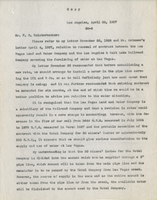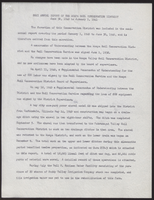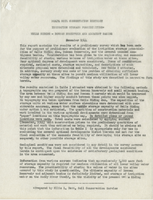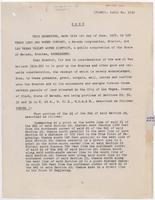Search the Special Collections and Archives Portal
Search Results

Transcript of interview with Michael Tell by Barbara Tabach, January 6, 2018
Date
Archival Collection
Description
Michael Tell, the youngest son of Jack and Beatrice Tell, is the publisher of the Las Vegas Israelite newspaper and the second generation of ownership. He briefly traces his Jewish ancestral roots back to Eastern European grandparents who settled in New Jersey and New York. He became a bar mitzvah in a conservative Jewish synagogue in New York City. At age sixteen, he accompanied his father, Jack Tell, westward to Nevada. The elder Tell was in pursuit of owning a newspaper and Mike was a perfect companion as Jack took over ownership of the Territorial Enterprise. Mike recalls it was a short lived venture and the family settled in Las Vegas, where his father went to work for Hank Greenspun at the Las Vegas Sun and then for Henderson Home News, owned by Morry Zenoff. In 1965, Jack Tell opened the Las Vegas Israelite. Meanwhile, Mike explored the lucrative business of concert promotions and opened a teen nightclub 1961 called the Twin Lakes Twist. He hired such talents of the era as Bobby Darin and Wayne Newton. Soon his business acumen grew and he moved Mike Tell Productions to Los Angeles. He tells the story of his last concert, booking Al Green, and being held at gunpoint. Then in 1979, he returned to work at the Israelite, which had a circulation of about 2000. The Jewish community was beginning to show signs of growth. He recalls running an ad in 1992 for High Holy Days services to be held at the Aladdin hotel. He used the word “Lubavitvh” in the ad and this sparked an interest in Las Vegas from the Chabad movement. He also recalls anti-Semitic episodes in Las Vegas, such as Ralph Englestad’s Hitler birthday parties and the presence of Skinheads. And he reflects on the changes in the community that he has observed over the decades.
Text

Anita Tijerina Revilla oral history interview: transcript
Date
Archival Collection
Description
Oral history interview with Anita Tijerina Revilla conducted by Marcela Rodriguez-Campo on October 09, 2018 for the Latinx Voices of Southern Nevada Oral History Project. In this interview, Revilla discusses her early life in San Antonio, Texas. She talks about her decision to make education a priority, figuring out the college application process on her own, and her initial interest in social justice. Revilla talks about how her critical consciousness was developed, and her pedagogical approach to teaching. Revilla describes her role in the 2006 May Day march, advocating advocating for the queer community, and disrupting oppressive systems to increase educational access for students. Lastly, Revilla discusses ethnic studies and the history of inequality in the United States.
Text
Michelle Merced (Neighborhood Housing Services of Nevada) oral history interview conducted by Kelliann Beavers: transcript
Date
Archival Collection
Description
From the Lincy Institute "Perspectives from the COVID-19 Pandemic" Oral History Project (MS-01178) -- Community organization interviews file.
Text

Agreement for the delivery of water and power to be sold in Las Vegas, March 22, 1921
Date
Archival Collection
Description
Agreement for the Los Angeles & Salt Lake Railroad Company to deliver water and power for the Las Vegas Land and Water Company to sell in Las Vegas.
Text

Letter from F. R. Adamson (Los Angeles) to F. H. Knickerbocker, April 22, 1927
Date
Archival Collection
Description
A suggestion that although the renewal of the agreement between the Railroad and the Las Vegas Land and Water Co. was unimportant, since both were wholly owned by the Union Pacific, they should take the opportunity to use meters to figure out how much water the water company was using.
Text

Letter from R. L. Adamson (Los Angeles) to F. H. Knickerbocker, July 29, 1927
Date
Archival Collection
Description
Discussion of the steps to be taken at the Las Vegas Springs and well field to increase water production.
Text

Semiannual report of the Moapa Soil Conservation District, from June 30, 1940 - January 1, 1941
Date
Archival Collection
Description
Summary of the work of the Moapa Soil Conservation Service for the last half of 1940.
Text

Report of Las Vegas water during fourteen years, 1957
Date
Archival Collection
Description
Overview of fourteen years of water use in the Las Vegas Valley showing water sales and consumption in gallons.
Text

Report by Moapa Soil Conservation District on irrigation storage possibilities of Wells Siding, Bowman Reservoir, and adjacent basins, December 1944
Date
Archival Collection
Description
Results of a preliminary survey of irrigation storage potential of Wells Siding, Bowman Reservoir and other nearby sites.
Text

Deed for nine specific parcels of land, Las Vegas Land and Water Company to the Las Vegas Valley Water District, Audit No. 5350, June 1, 1954
Date
Archival Collection
Description
Deed of the land sold to the Las Vegas Valley Water District from the Las Vegas Land and Water Company, except for the water right reserved in Helen Stewart's deed. Notarized by Louis Scholnick in Douglas County, Nebraska on June 3, 1954.
Text
